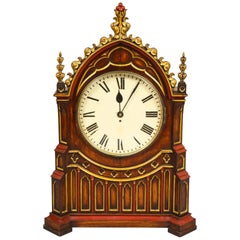Gothic Fusee Clock
Antique Mid-19th Century English Gothic Revival Mantel Clocks
Oak
People Also Browsed
Antique 19th Century French Gothic Revival Architectural Elements
Wood, Giltwood
2010s Italian Glass
Glass
Antique Mid-19th Century English High Victorian Taxidermy
Other
21st Century and Contemporary Books
Foil
Antique 19th Century English Gothic Revival Beds and Bed Frames
Walnut
Antique Late 19th Century English Georgian Mantel Clocks
Mahogany
Mid-20th Century English Renaissance Beds and Bed Frames
Oak
Early 20th Century French Gothic Revival Wall Clocks
Wrought Iron, Brass, Enamel
Antique 1840s British Gothic Armchairs
Hardwood
Antique Early 1800s British Gothic Revival Table Clocks and Desk Clocks
Bronze, Metal
Antique 19th Century English Gothic Revival Lanterns
Bronze
Antique Late 18th Century Great Britain (UK) George III Wall Clocks
Early 20th Century American Art Nouveau Table Lamps
Bronze, Lead
Antique Late 18th Century British George III Mantel Clocks
Wood
Antique 19th Century American Gothic Revival Wardrobes and Armoires
Brass
Antique Late 18th Century German Neoclassical Revival Grandfather Clocks...
Brass, Iron
Finding the Right Clocks for You
A sophisticated clock design, whether it’s a desk clock, mantel clock or large wall clock for your living room, is a decorative object to be admired in your home as much as it is a necessary functional element. This is part of the reason clocks make such superb collectibles. Given the versatility of these treasured fixtures — they’ve long been made in a range of shapes, sizes and styles — a clock can prove integral to your own particular interior decor.
Antique and vintage clocks can whisk us back to the 18th and 19th centuries. When most people think of antique clocks, they imagine an Art Deco Bakelite tabletop clock or wall clock, named for the revolutionary synthetic plastic, Bakelite, of which they’re made, or a stately antique grandfather clock. But the art of clock-making goes way back, transcending continents and encompassing an entire range of design styles and technologies. In short, there are many kinds of clocks depending on your needs.
A variety of wall clocks can be found on 1stDibs. A large antique hand-carved walnut wall clock is best suited to a big room and a flat background given what will likely be outwardly sculptural features, while Georgian grandfather clocks, or longcase clocks, will help welcome rainswept guests into your entryway or foyer. An interactive cuckoo clock, large or small, is guaranteed to bring outsize personality to your living room or dining room. For conversation pieces of a similar breed, mid-century modern enthusiasts go for the curious Ball clock, the first of more than 150 clock models conceived in the studio of legendary architect and designer George Nelson.
Minimalist contemporary clocks and books pair nicely on a shelf, but an eye-catching vintage mantel clock can add balance to your home library while drawing attention to your art and design books and other decorative objects. Ormolu clocks dating from the Louis XVI period, designed in the neoclassical style, are often profusely ornate, featuring architectural flourishes and rich naturalistic details. Rococo-style mantel clocks of Meissen porcelain or porcelain originating from manufacturers in cities such as Limoges, France, during the 18th and 19th centuries, exude an air of imperial elegance on your shelves or side tables and can help give your desk a 19th-century upgrade.
On 1stDibs, find a range of extraordinary antique and vintage clocks today.
- 1stDibs ExpertApril 5, 2022A fusee clock uses a mainspring barrel, a fusee and a chain coiled around an arbor. The barrel pulls at the chain, winding the fusee. This pulley method was considered revolutionary at the time, but its mechanical origins can be traced back to the 1600s. This type of watch movement faded out of favor in the mid 1700s. Shop a collection of properly vetted fusee clocks from some of the world’s top sellers on 1stDibs.
- How do you set a fusee clock?1 Answer1stDibs ExpertApril 5, 2022A fusee clock uses a wound cord or chain around a spindle with a pulley to keep time with a symmetrical tick and tock. To wind a fusee clock, a key is needed to unwind the chain off the barrel and back onto the fusee. Moving the hands to the correct time prior to winding is no trick, so setting the time is fairly easy—it’s setting the gears or winding that can be difficult to get just right. Shop a collection of fusee clocks from some of the world’s top sellers on 1stDibs.
Read More
Kazuyo Sejima’s Flowering Tree Blooms Year-Round
The brilliantly simple design turns a modest bouquet into a major statement.
He Wrote ‘Oedipus Rex,’ but Do You Know What He Looked Like?
The Greek tragedian is said to have been handsome in his day.
Cigar Culture Was Once the Peak of Masculinity. Now, It’s a Compelling Curiosity
Even for those who don’t indulge, elegant smoking accessories and audacious art portraying cigar enthusiasts hold a nostalgic allure.
African Travel Plans on Hold? This Ardmore Leopard Vase Brings the Beauty of the Savanna to You
It’s an excellent example of the sought-after ceramics coming out of South Africa’s KwaZulu-Natal province.
With a High-Tech Flagship and Cool Collabs, Lladró Is Breaking the Mold for Porcelain Production
Thanks to its new leadership, the Spanish maker of figurines, busts and lighting is on a mission to update the art of porcelain for the 21st century.
Zoë Powell’s Magnolia 05 Vessel Is Handmade from Clay She Unearthed Herself
The free-form stoneware piece is inspired by the magnolia tree and its associations with home.
8 Ways to Breathe New Life into a Space with Plants
The pair behind the Instagram account @houseplantclub share their tips for making any room of the house gloriously green.
Paris Gallerist Sandy Toupenet Gets Fired Up over 20th-Century Ceramics and Inventive New Makers
Her space on the city’s Left Bank mixes mid-century pieces by the likes of Jean Cocteau and Pablo Picasso with whimsical contemporary creations.
